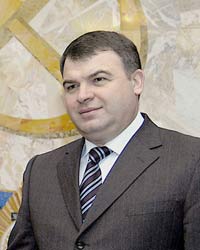Kosovo likely to dominate NATO-Russia talks
Differences over Kosovo and U.S. plans to install missile defenses in eastern Europe were expected to dominate talks Thursday between Russian Defense Minister Anatoly Serdyukov and his NATO counterparts.

The meeting comes days after U.S. Defense Secretary Robert Gates announced that Washington may delay activating the proposed missile defense sites in Poland and the Czech Republic until it has "definitive proof" of a missile threat from Iran.
The announcement was widely seen as an attempt to mollify Russian opposition to the U.S. plan. Moscow says Iran is decades away from developing missile technology that could threaten Europe or North America, and claims the U.S. bases will undermine Russia's own missile deterrent force.
In recent weeks Washington has made a number of proposals to clam Russian concerns, including the possible delay in activating the sites, an offer to share information from missile tracking radar units and allowing Russian observers at U.S. facilities.
Since then the Russians have given mixed signals. President Vladimir Putin last week said he detected "a certain transformation" in the U.S. view that allowed for continued dialogue. However, the next day, Russia's military chief of staff, Gen. Yuri Baluyevsky, restated Moscow's objections and said there was "nothing new" in the U.S. proposals.
"I expect that there will be some frank, robust discussion too of some of those issues on which there are disagreements between NATO allies and the Russian Federation," said John Colston, NATO's assistant secretary-general for defense policy, before the talks.
The U.S. plan would install a radar base in the Czech Republic and 10 interceptor missiles in Poland. It is part of a wider missile shield involving defenses in California and Alaska which the United States says are to defend against any long-range missile attack from countries such as North Korea or Iran.
Piqued by the U.S. plans, Russia has frozen cooperation with NATO on a separate project to develop defenses against short-range battlefield missiles. Putin has also threatened to pull out of a Cold War-era treaty controlling conventional forces in Europe.
Russia and NATO nations are also divided over Kosovo. Moscow opposes a Western backed plan to grant the province internationally supervised independence from Serbia. While talks continue, Kosovo's ethnic Albanian majority is promising to follow through on a threat to declare independence unilaterally in December if their is no settlement.
NATO ministers Wednesday agreed to maintain the alliance's 16,000 peacekeepers in the territory and ready for any new outbreak of violence.
"We'll keep up that level," NATO Secretary-General Jaap de Hoop Scheffer told reporters. "There is, of course, not a single argument to bring down the force levels. We have to see to it that KFOR is ready for all eventualities, that KFOR is able to protect majority and minority alike."
Kosovo has been administered by the United Nations and patrolled by NATO troops since the 1999 allied air campaign which ended a Serbian crackdown on pro-independence forces.
Before the talks with Serdyukov, NATO ministers were discussing proposals to scale down a new elite force less than a year after it was declared ready to serve as the spearhead of the allies' military modernization drive.
Allied commanders have been forced to rethink the NATO Response Force because the deployment of so many troops to Afghanistan, the Balkans, the Middle East and Africa has left the 26 nations without enough combat troops to maintain the 25,000-strong unit.
Subscribe to Pravda.Ru Telegram channel, Facebook, RSS!


